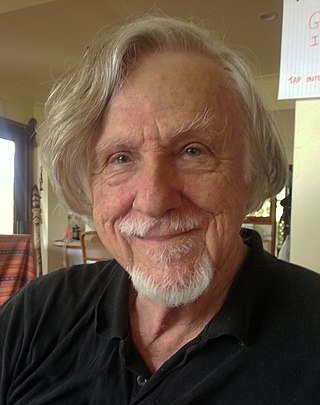Related Research Articles

The National Film Board of Canada is Canada's public film and digital media producer and distributor. An agency of the Government of Canada, the NFB produces and distributes documentary films, animation, web documentaries, and alternative dramas. In total, the NFB has produced over 13,000 productions since its inception, which have won over 5,000 awards. The NFB reports to the Parliament of Canada through the Minister of Canadian Heritage. It has bilingual production programs and branches in English and French, including multicultural-related documentaries.

William Norman McLaren, LL. D. was a Scottish Canadian animator, director and producer known for his work for the National Film Board of Canada (NFB). He was a pioneer in a number of areas of animation and filmmaking, including hand-drawn animation, drawn-on-film animation, visual music, abstract film, pixilation and graphical sound. McLaren was also an artist and printmaker, and explored his interest in dance in his films.

Nicholas Lea is a Canadian actor known for his portrayal of Alex Krycek on The X-Files and of Tom Foss on Kyle XY.
George Garnett Dunning (1920–1979) was a Canadian filmmaker and animator. He is best known for producing and directing the 1968 film Yellow Submarine.

Michael Dattilo Rubbo is an Australian documentarian/filmmaker.
Don Owen was a Canadian film director, writer and producer who spent most of his career with the National Film Board of Canada (NFB). His films Nobody Waved Good-bye and The Ernie Game are regarded as two of the most significant English Canadian films of the 1960s.
René Jodoin was an animation director and producer who founded the French-language animation studio of the National Film Board of Canada. Born in Hull, Quebec on December 30, 1920, Jodoin died in Montreal on January 22, 2015 at the age of 94.
Colin Archibald Low was a Canadian animation and documentary filmmaker with the National Film Board of Canada (NFB). He was known as a pioneer, one of Canada's most important filmmakers, and was regularly referred to as "the gentleman genius". His numerous honors include five BAFTA awards, eight Cannes Film Festival awards, and six Academy Award nominations.
Hugh O'Connor was a Canadian director and producer who worked for the National Film Board of Canada (NFB). His best- known film is the ground-breaking In the Labyrinth (1967), but his promising career ended shortly after that film's release when he was murdered while filming in Kentucky.

Grant Munro LL. D. was a Canadian animator, filmmaker and actor. In 1952, he co-starred with Jean-Paul Ladouceur in Norman McLaren's Neighbours. His film, Christmas Cracker, was nominated for an Academy Award in 1965.
Whistling Smith is a 1975 short documentary film directed by Marrin Canell and Michael J. F. Scott for the National Film Board of Canada. It was produced for the NFB's Pacificanada series, which aired on CBC-TV in early 1975.

Gerald Potterton was a Canadian director, animator, producer and writer. He is best known for directing the cult classic Heavy Metal and for his animation work on Yellow Submarine.
Adieu Alouette was a Canadian television documentary anthology series on the life and culture of Quebec. It was produced by the National Film Board of Canada for the network and aired on CBC Television in 1973.
West is a Canadian documentary television series that aired on CBC Television from 1973 to 1974.
Guy Glover was a senior National Film Board of Canada (NFB) producer and administrator.
The 27th Canadian Film Awards were held on October 12, 1975 to honour achievements in Canadian film. The ceremony was hosted by radio personality Peter Gzowski.
The 21st Canadian Film Awards were held on October 4, 1969 to honour achievements in Canadian film. The ceremony, attended by 1,200 people, was hosted by broadcaster Fred Davis.
The 25th Canadian Film Awards were announced on October 12, 1973, to honour achievements in Canadian film.
The 17th Canadian Film Awards were held on May 15, 1965 to honour achievements in Canadian film.
The 4th Canadian Film Awards were presented on April 27, 1952 to honour achievements in Canadian film.
References
- 1 2 3 4 5 6 7 Ohayon, Albert. "Pacificanada: British Columbia Seen through the NFB Lens". NFB.ca. National Film Board of Canada . Retrieved 30 March 2012.
- ↑ Corcelli, John (September 2005). "Pacificanada". Canadian Communications Foundation. Retrieved 7 May 2010.